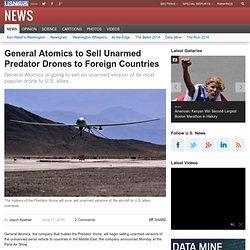

Gary Haugen: The hidden reason for poverty the world needs to address now. From Bug Drones to Disease Assassins, Super Weapons Rule US War Game. Sailors train for chemical and biological warfare.

Photo: U.S. Navy CARLISLE, Pennsylvania — A rogue state is on the verge of developing a deadly biological weapon against which the rest of the world has no defense. Through its connections to extremist groups and smugglers, the regime could be planning to launch bio attacks on U.S. allies and interests. With tensions mounting, a cabal of American military officers, intelligence agents, scientists, industry officials and theoreticians gather at a secure facility within the Defense Department’s oldest base. A quiet man wearing a dark suit stands and the room grows silent. The scenario — the rogue state with its bio-weapon — is fictional. The NextTech Workshop, as the war game was branded, was actually the second in a four-part series of intellectual exercises meant to explore how “future advancements in different technology focal areas may be used in given scenarios,” according to a Noetic handout. Though not without risk.
General Atomics to Sell Unarmed Predator Drones to Foreign Countries. General Atomics, the company that makes the Predator drone, will begin selling unarmed versions of the unmanned aerial vehicle to countries in the Middle East, the company announced Monday at the Paris Air Show.

[READ: Drone Strikes on American Citizens Banned in New Defense Bill Amendment] In an interview with Military.com, Christopher Ames, director of international strategic development for the company, said the Predator XP will be sold to the United Arab Emirates. The Predator XP will be unarmed, but will have radar and cameras to give countries intelligence and surveillance capabilities. "It opens up a whole range of new markets that had been previously closed," Ames told Military.com. "Allies and coalition members were saying, 'When do we get our Predator? '" Since introducing the Predator in 1994, the $4.3 million drone has become a workhorse for the CIA and the Air Force – armed versions are primarily used for drone strikes overseas. More News:
Hotspots of potential conflict in the geo-energy era. Amherst, Massachusetts - Welcome to an edgy world - where a single incident at an energy "chokepoint" could set a region aflame, provoking bloody encounters, boosting oil prices, and putting the global economy at risk.

With energy demand on the rise and sources of supply dwindling, we are, in fact, entering a new epoch - the Geo-Energy Era - in which disputes over vital resources will dominate world affairs. In 2012 and beyond, energy and conflict will be bound ever more tightly together, lending increasing importance to the key geographical flashpoints in our resource-constrained world. Take the Strait of Hormuz, already making headlines and shaking energy markets as 2012 begins. Connecting the Persian Gulf and the Indian Ocean, it lacks imposing geographical features like the Rock of Gibraltar or the Golden Gate Bridge.
In an energy-conscious world, however, it may possess greater strategic significance than any passageway on the planet.
It's Not as Easy as 1-2-3 - By Jeffrey Lewis. You may not have noticed -- hardly anyone has -- but Barack Obama's administration is rewriting the rules governing the global trade in civil nuclear technology.

The revisions are the most significant in three decades, and the outcome will probably determine whether the anticipated expansion of nuclear power in the developing world -- the so-called nuclear renaissance -- happens without a corresponding spread of nuclear weapons programs. In 2009, the United States seemed to signal a hard-line approach when it agreed to cooperate with the United Arab Emirates (UAE) on civilian nuclear technology only on the condition that the country not pursue the ability to enrich uranium to make fresh nuclear fuel or to reprocess plutonium from spent nuclear fuel to recycle it in reactors. These technologies, as every casual Iran watcher now knows, are the same as those used to make fissile material for a nuclear bomb. Officials from George W. Enter Taiwan. Why? FREDERICK FLORIN/AFP/Getty Images. What Ancient Greeks Can Teach Us about Drones and Cyber-War.
When freshmen in my humanities colloquium at Stevens Institute of Technology ask why they have to read stuff by ancient Greeks, I reply that we have much to learn from old guys like Thucydides.

In his history of the Peloponnesian War, a clash between the city-states Athens and Sparta, Thucydides recounted a negotiation between Athenians and leaders of Melos, an island kingdom striving to remain neutral. The Athenians gave the Melians a choice: submit peacefully to our rule and pay us tribute, or we will destroy you. The Melians, completely outmatched by the Athenian army, pointed out that the Athenians were not dealing with them justly. The Melians hadn’t done anything to hurt Athens or help Sparta; they just wanted to keep to themselves.